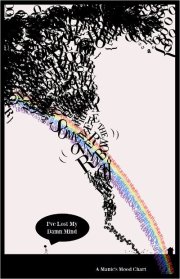 Derek Thompson is a confident young man. “The reason I enjoy making lists so much,” he writes, “is that it is almost impossible to screw up. I mean it’s your list.” So it is with memoir: personal experience is something owned.
Derek Thompson is a confident young man. “The reason I enjoy making lists so much,” he writes, “is that it is almost impossible to screw up. I mean it’s your list.” So it is with memoir: personal experience is something owned.
Although this book is primarily made with blog posts, this is definitely a memoir. While I’m certain Derek would be first in line to acknowledge he’s not a writer of fine literature, his blog posts aren’t “random thought” or diary-type entries; this is a collection of essays, each containing a narrative arc, a thought process, if you will, that is personally owned.
Derek started writing his blog because “I had everything figured out. I was on the fast track to success,” when “all of a sudden everything I thought I knew and understood about life and the world was completely gone.” He had to begin living through alternating manic episodes and bouts of severe depression, starting with a psychotic episode that included hallucinations and delusional thinking. Overnight, Bipolar Mood Disorder moved in and never left town. He’s also had to endure nightmares and suicidal thoughts at times, but depression is what Derek fears most: “I lose my identity.”
Parallel to his finding a lifestyle that will not exacerbate his condition, Derek has also found a new identity emerging. His essays include childhood memories and recollections from his teen years; what unfolds is that having BMD has returned him to the child within. He runs with this concept by finding laughter whenever and wherever available, frankly describing himself as a “big kid” going through a second puberty, and making no bones about his juvenile sense of humor. Accepting Derek’s sense of humor is one key to appreciating this book and getting through explicit description of some experiences that would make anyone uncomfortable just to read about let alone live.
He also uses his favorite movies as reference points; while I haven’t seen any of the movies he loves (well, maybe a couple), I again accepted this while making my way through the book, whose title derives from Derek’s sometimes notion that he is the Wizard of Oz. But this fanciful side is again providing a balance for rather stark experiences, such as the burden of having a pre-existing medical condition: “Finding a doctor who will see you without insurance is about as likely as Pittsburgh Steelers fans from Ohio acting like they’re not conceited pricks.”
Derek lives at times in an uncooperative world (no medical insurance, social stigma, losing jobs, unable to get a date, losing friends), but he also finds new things to be in awe of, such as an appreciation for his home town that he may not have attained had he been able to continue his climb of the corporate ladder after college: “Everyone is your neighbor, and in times of crisis, help isn’t asked for; it’s already been given.”
Underlying situational challenges are emotions to be faced, such as shame: “A twenty-eight-year-old single guy, starting over from scratch because I had failed.” Derek consciously avoids wallowing, even during episodes of depression. He finds strength by asking himself: “Why did all of this happen to me, and what am I supposed to do with it?” His answer is to write. Those who have attempted it know that writing regularly involves discipline and I find it impressive that Derek’s blog is still, as of this date, being updated on a weekly basis. The amount of work involved to present his writings in book form also did not escape me (the Glossary de Slang in the front is delightful) (and necessary).
There was one last thing I had to accept in order to get through Derek’s book: his use of grammar and punctuation. He addresses the topic about two-thirds of the way through the book, telling his readers: “I’ve made my peace with it and moved on. So should you.” This may not make sense (especially if you know how I feel about grammar and punctuation), but this “moving on” is part of the reading process in getting to know Derek.
In writing these essays and making a book out of them, Derek is not on a quest to find answers as to “a cause” of his condition. This memoir is, rather, a search for personal meaning, not in a Noble Struggle sort of fashion, but in terms of Derek’s accepting that his brain works differently now, while figuring out how to live with it responsibly. “While I know what happened was not my fault,” he says, “that doesn’t mean I should write it off and not learn from it.” If you want to know what it’s like to have BMD, read some clinical studies on the subject. This is a book about what it’s like to have BMD and be Derek Thompson, and why I give it five stars.
Links
Get an Editorial Review | Get Amazon Sales & Reviews | Get Edited | Get Beta Readers | Enter the SPR Book Awards | Other Marketing Services






















Leave A Comment